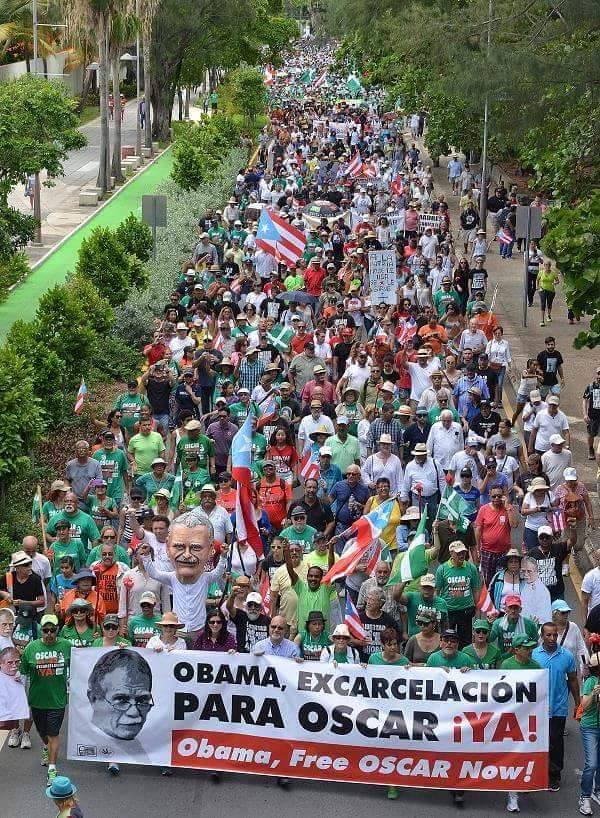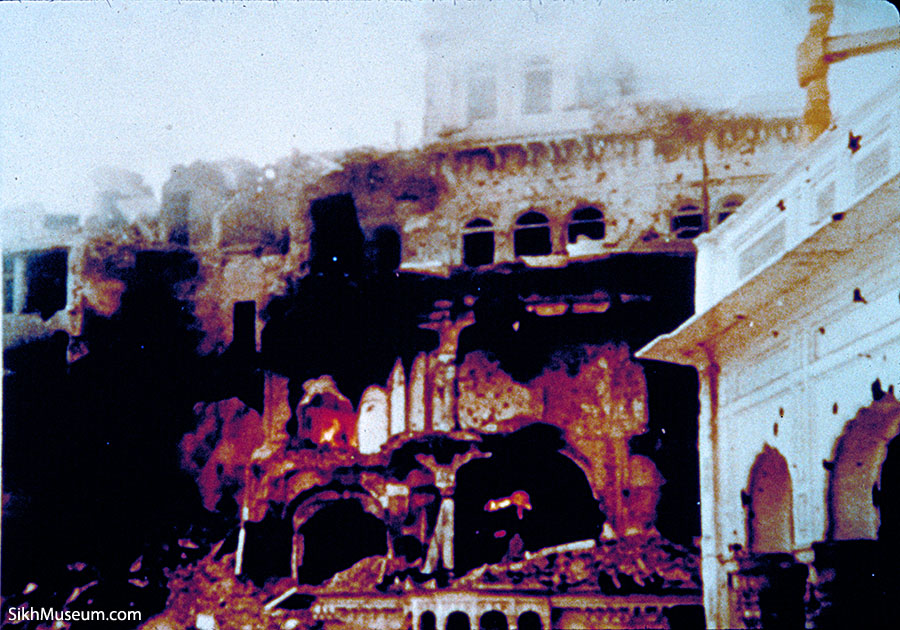
|
June 4, 2016 - No. 23 Quebec's
Self-Serving Political Reforms Increasing State Control over Political Parties to Keep the People Disempowered  • Resolution
of Five Registered Political Parties Quebec's Self-Serving Political Reforms Increasing State Control over Political Parties to
|
|
Peoples of Latin America and the
Caribbean Deepen Fighting Unity
Venezuela
Latin American and Caribbean Countries Defeat
OAS
Attempt to Support Coup Forces

Mass rally rejecting foreign intervention, Caracas, Venezuela,
June 1, 2016.
Attempts by the Organization of American States (OAS) through its Secretary General Luis Almagro to suspend Venezuela's OAS membership on June 1 were defeated by the unanimous vote of OAS members led by the countries of Latin America and the Caribbean. Representatives had gathered at a Extraordinary Session of the OAS Permanent Council suddenly convened with one day's notice. The meeting was suspended at the request of Venezuela after adopting a declaration of support for dialogue between the Venezuelan government and opposition and repudiating foreign intervention. Almagro was criticized by numerous delegations for his posture towards Venezuela and for taking unilateral action against the Bolivarian Republic.
OAS Secretary General Almagro has been waging an increasingly desperate campaign against the government of Venezuela in concert with Venezuelan opposition representatives calling for foreign intervention and reactionary figures from the U.S., Europe and across Latin America. The OAS leadership, based in Washington, DC and mostly funded by the U.S. and Canada, carries out the policy of U.S. imperialism under the cover of what the OAS calls the "inter-American system." In this regard, Almagro's attempt to isolate Venezuela marked an escalation of the attempts to foment regime change in Venezuela which have been ongoing since the defeat of the 2002 U.S.-backed coup against Hugo Chávez.
On May 13, Almagro attended a meeting in Miami, Florida with members of the Venezuelan opposition, U.S.-backed former Latin American presidents and a former Spanish Prime Minister. At the meeting former Colombian President Alvaro Uribe called for military intervention in Venezuela. Since then Almagro's main focus in his position as OAS head has been to attack Venezuela, ignoring the fact that a coup d'état was just carried out in Brazil. Without any consultation with the OAS member states Almagro has been using the platform of the OAS, its official publications and social media accounts to push for penalties against Venezuela, including publishing a 132-page document making his case for Venezuela's suspension.
The purpose of the June 1 meeting was to consider invoking the OAS "Inter-American Democratic Charter," which allows for the suspension of a member if it is deemed that it has violated what the Charter terms democratic principles.[1]
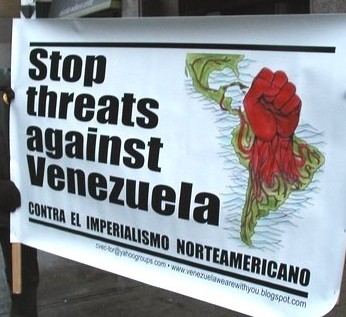 OAS members strongly
repudiated the efforts of the
organization's leadership. Ecuadorian President Rafael Correa
pointed out, "The call by the OAS secretary was not based on
consensus. The other member countries of the OAS were not
consulted. It is an opinion and attitude sui generis of
Diego Almagro[2], which
is
completely out of line." Jamaican Ambassador to the OAS Julia
Elizabeth Hyatt condemned Almagro's hysterical campaign against
Venezuela, saying Jamaica "considers totally unacceptable and
unfortunate certain recent utterances by the Secretary
General..." Venezuelan Foreign Minister Delcy Rodriguez accused
Almagro of being obsessed with ousting Maduro, pointing out that
he "has dedicated 36.4 per cent of his Twitter account against
Venezuela."
OAS members strongly
repudiated the efforts of the
organization's leadership. Ecuadorian President Rafael Correa
pointed out, "The call by the OAS secretary was not based on
consensus. The other member countries of the OAS were not
consulted. It is an opinion and attitude sui generis of
Diego Almagro[2], which
is
completely out of line." Jamaican Ambassador to the OAS Julia
Elizabeth Hyatt condemned Almagro's hysterical campaign against
Venezuela, saying Jamaica "considers totally unacceptable and
unfortunate certain recent utterances by the Secretary
General..." Venezuelan Foreign Minister Delcy Rodriguez accused
Almagro of being obsessed with ousting Maduro, pointing out that
he "has dedicated 36.4 per cent of his Twitter account against
Venezuela."
At the start of the meeting, representatives of Venezuela, Nicaragua and Bolivia refuted spurious accusations against the Venezuelan government and led the rejection of adopting any text that promotes foreign intervention.
The final text of the declaration approved by OAS members on June 1 said in part, "We reiterate our support for the various initiatives of national dialogue that will lead, under full respect for human rights, to a timely, prompt and effective solution to the differences and consolidation of representative democracy." The declaration highlighted the need for respecting Venezuela's sovereignty and that mediation and dialogue should take place under the auspices of the Union of South American Nations (UNASUR). Discussions facilitated by UNASUR began in the Dominican Republic on May 30 between the Venezuelan government and opposition.
The only Latin American country to express support for Almagro invoking the "Democratic Charter" was Paraguay, whose government was installed as the result of a coup in 2012. The representatives of Canada, the U.S. and Colombia all expressed reservations on the content of the declaration. Media report that Canadian representatives complained the declaration was "soft, weak and remains silent on the basic fundamental principles of human rights." However, with the unity of the Latin American and Caribbean countries none dared to obstruct the declaration or openly push for invoking the Charter.
The Ministry of Foreign Affairs of the Republic of Cuba issued a statement on June 2 explaining the significance of Venezuela's diplomatic victory. The statement pointed out that Venezuela "undertook a difficult but victorious diplomatic battle against the interventionist plans of imperialism and oligarchies" but that the efforts managed to "reassert the principle of non-intervention in the internal affairs of states, and the right of these to choose their own political, economic, and social systems, without external interference, as established in the Proclamation of Latin America and the Caribbean as a Zone of Peace, signed by heads of state and government during the Community of Latin American and Caribbean States Summit, held in Havana in January of 2014."
Cuba's statement continued:
"The hysterical, awkward, unethical manner in which the OAS Secretary General attempted to serve dark interests is surprising.
"Mr. Almagro attempted to apply the Inter-American Democratic Charter, in particular its Article 20, allegedly directed toward responding to severe breakdowns or alterations in constitutional order, which was not invoked at the time of the 2002 coup against President Hugo Chávez Frías, nor to condemn coup attempts which have plagued the region over the last 15 years, with only one exception in 2009, when the United States and some right-wing forces mounted strong resistance.
"To do so, assuming authority which he does not possess, without any mandate from member states, with the support of elements of Venezuela's coup-plotting opposition and other reactionaries with dubious reputations, Mr. Almagro wrote a slanderous, interventionist report, which he made public in violation of established procedures.
"All appearances indicated that a triumphal parade was at hand, but the Secretary General, OAS bureaucrats, and their ghastly mentors forgot that we do not live in 1962, when with shameful complicity the organization tried and convicted socialist Cuba.
"Making the difference were the tone of the debate; forceful condemnations of the Secretary General's indecent role; the firm positions of ALBA-TCP sister nations; the calm, clear arguments of those who have chosen dialogue; respect among countries and peace as diplomatic norms; and the measured but firm Caribbean resistance to the treacherous conspiracy against Venezuela.
"The Ministry of Foreign Relations considers what has now occurred in Washington as new evidence that Our America has changed, although the OAS continues to be an unreformable instrument of U.S. domination over the peoples of Latin America and the Caribbean, a reminder of what President Raúl Castro Ruz said in December of 2008, and reiterated during the recent 7th Congress of the Communist Party of Cuba, when paraphrasing José Martí, he asserted, ‘Before Cuba returns to the OAS, the northern seas will unite with the southern seas, and a snake will be born from the egg of an eagle.'
"We once again reiterate to the supportive and generous Bolivarian, Chavista Revolution, to President Nicolás Maduro Moros, the civic-military union, and the valiant people, the full support of the Revolutionary people and government of Cuba, and our unwavering confidence in the triumph of their just cause."
TML Weekly congratulates the President and government of the Bolivarian Republic of Venezuela and all the countries of Latin America and the Caribbean who stood for the sacred principle of non-intervention in the affairs of sovereignty countries and for Latin America to be a Zone of Peace. The fighting unity of the peoples in defence of these principles is an indispensable ingredient to ensure the crimes of imperialism, regime change and counterrevolution in Latin America and the Caribbean are not repeated and multiplied.
Notes
1. The "Inter-American
Democratic Charter" was adopted on
September 11, 2001 by a special session of the General Assembly
of the OAS in Lima, Peru. It was drafted behind the scenes by the
U.S. imperialists without submitting its guiding principles or
specific points for discussion or approval by the parliaments of
the member countries of the OAS, let alone the citizenry. Earlier
attempts to adopt the Charter at the June 3-5, 2001 meeting of
the OAS in San José, Costa Rica failed with at least 16
countries
opposed to the Charter as presented. Up to 2009 the only country
of the Americas excluded from the OAS was Cuba, on the basis that
"Marxism-Leninism is incompatible with the inter-American
system." Despite the high ideals in its language the essence of
the Charter is to promote U.S. imperialist democracy as the ideal
against which other countries are measured. For this reason
countries which openly violate the letter of the text, such as
the U.S., Canada, the coup government in Brazil and the governments of
Mexico and Colombia are not raised as targets of the OAS.
2. Diego de Almagro was a Spanish soldier and conquistador, famous for his role in the defeat of the Inca Empire in Peru and Ecuador and his later participation in a bloody civil war among the victorious conquistadors. (Latinamericanhistory.about.com)
(With files from TeleSUR, Venezuelanalysis, AVN)
Mass Rallies in Support of Bolivarian Revolution
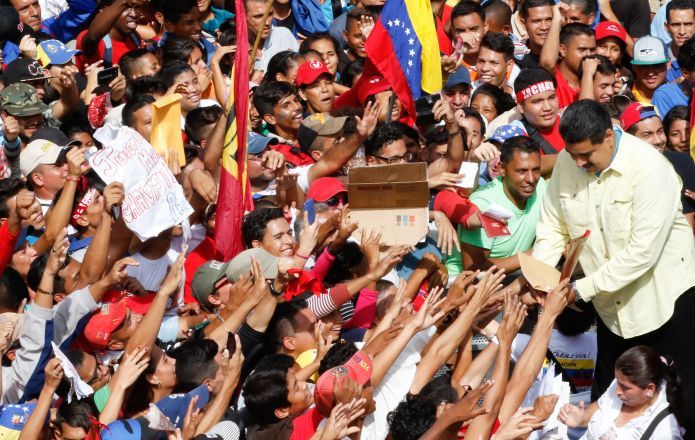
President Nicolás Maduro warmly greeted by youth at rally in
Caracas, June 1, 2016.
Venezuelans held a mass rally in the capital, Caracas, on June 1 and actions throughout the country led by youth to reject foreign intervention in Venezuelan affairs no matter the pretext. Demonstrators chanted, "Our country is not for sale, our country is ready to defend itself!" President Nicolás Maduro noted that "people of all backgrounds and from all corners of the country are participating to make their voices heard and those voices are clearly rejecting any form of foreign intervention." Speaking live to the Venezuelan people the day before, President Maduro affirmed that "seeking to intervene in Venezuela is a crime" and called for mobilizations.
The demonstrations came the same day as an attempt by Organization of American States (OAS) Secretary General Luis Almagro to invoke the so-called Inter-American Democratic Charter to isolate Venezuela and suspend it from the organization was defeated.
Representatives of 43 Indigenous nations marched
through the
streets of Caracas on June 2 to show their support for the
revolution. The nations were responding to a call from the
Venezuelan government to develop grassroots solutions to the
economic crisis the country is currently facing. The march
proceeded to the presidential palace, where leaders turned a
document directly over to President Maduro outlining their
proposals. According to the Minister for Indigenous Peoples Clara
Vidal, the document was a synthesis of proposals made by
Indigenous peoples in their territories. Maduro committed to
speed-up efforts to hand over land titles to Indigenous nations
for their territories.

Indigenous peoples rally in Caracas, June 2, 2016 in defence of the
Bolivarian revolution.
On May 31, thousands of transportation workers rallied to reject interference by the OAS and U.S. imperialists. Bus drivers, motorbike couriers, subway staff and others organized their demonstration in defence of the Bolivarian revolution and its policies on public transport. During the rally, news broke that OAS Secretary General Almagro had invoked the "Democratic Charter" to call a meeting to debate the suspension of Venezuela from the organization. Transport workers organized to denounce the move. President Maduro, himself a bus driver and union leader in the transportation sector, addressed the rally and said he would not hesitate to call for a "national rebellion" in the event of foreign aggression.
Speaking to members of the Bolivarian National Armed Forces the same day, President Maduro affirmed that only the Bolivarian Revolution can consolidate stability in Venezuela. "We have to fight and win this battle and make our country a safe, stable nation. Only we can do it because we have a real commitment to the people, because we have a project, and because we want to. Only we can do it," said President Maduro. He denounced the May 28 killing of Felix Velasquez, a retired Army Major General, and pointed to links between local police forces connected to the killing and the U.S. embassy in Venezuela.
The Bolivarian Armed Forces released a statement on June 2 calling for unity to confront the growing threats of foreign intervention. "We must preserve our peaceful vocation, but at the same time, we must defend the traditions inherited from the founding fathers of independence," the statement said. It noted that the threats of intervention from the OAS and others rely on "a negative and biased vision of the country, quite different from reality."
(TeleSUR. Photos: AVN)
U.S. and Canada Should Not Interfere in
Venezuela's Internal
Affairs
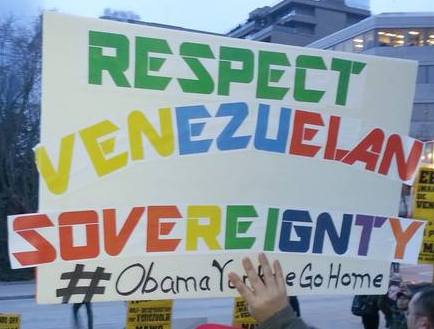 Venezuela is one of the
five greatest exporters of oil in
the world and provides about 15 per cent of the supply of the
U.S. It is not surprising, therefore, that the U.S. has tried to
control the policies of the Venezuelan government with or without
the consent of Venezuelans.
Venezuela is one of the
five greatest exporters of oil in
the world and provides about 15 per cent of the supply of the
U.S. It is not surprising, therefore, that the U.S. has tried to
control the policies of the Venezuelan government with or without
the consent of Venezuelans.
About 95 per cent of Venezuela's export earnings are due to oil, and because of the competitiveness of imports and the lack of competitiveness, relative to oil, of exports, Venezuela imports a large proportion of its basic needs. This makes the country very vulnerable to oil price fluctuations.
In the late 1980s, under a "social democratic government (Accion Democratica)," the world price of oil dropped very significantly, causing Venezuela to go into high debt with the international financial system in order to satisfy its needs. The above financial system, through the International Monetary Fund, imposed socially explosive conditions on the country in order to pay its debt, leading to sky rocketing inflation, sudden impoverishment of most of the middle class and food riots by the desperately poor, resulting in mass shooting of thousands of poor people in the slums by security forces. During this episode there was no scarcity of basic goods and services, because the increase in prices made them unaffordable to the poor, but not to the rich.
The latest similar major slump in oil prices, under the Bolivarian Revolutionary government, is worse than the above one, because it is longer lasting. There is rampant inflation and food scarcities. However, unlike the previous slump, the price of basic necessities is now being maintained at an affordable level for the poor, leading to high demand and therefore long lineups and scarcity. Unlike the government during the previous slump, this one has maintained all the social services, because one of the aims of the Bolivarian Revolution is to end poverty and marginalization. Governments prior to the Revolution allowed the market to dictate prices regardless of people's needs.
The slump in oil prices is only the latest of many blows to the Bolivarian Revolution. These include a failed coup by the wealthy elites and their friends in the armed forces. In 2002, President Hugo Chávez was kidnapped and the Chamber of Commerce and its wealthy allies began to dismantle the elected government and its pro-poor laws attained by referenda, only to be foiled by mass demonstrations that successfully demanded the return of the popular elected President, government and Constitution. This failed attempt at "regime change" was followed by a mass lockout of the main commercial and manufacturing sectors, including the state-owned oil company, only to be foiled, once again, by workers, unions and employees faithful to the Revolution taking over and running locked out enterprises.
The opposition then tried a recall referendum (allowed by the Bolivarian Constitution) and lost the popular vote, as well as more than a dozen elections.
Finally, after the author of the Bolivarian revolution, President Hugo Chávez, died of cancer, the opposition lost the presidential election once again and took to the streets in violent demonstrations, aiming to overthrow the government, with barricades and burning of government institutions and property, resulting in 43 deaths, half being pro-government, the other half being from the opposition. The violence was rejected by the majority of Venezuelans, thus, once more, foiling the attempt at "regime change."
The opposition and their corporate allies (both foreign and local) finally found a strategy that could truly hurt the revolutionary government, taking advantage of its policy of providing affordable prices of basic goods to the poor. The government has a fixed low exchange rate of local currency to the U.S. dollar, and sells the petrodollar earnings to enterprises that produce and/or import basic necessities at this favourable exchange rate, so they can import goods and sell them at affordable prices. These enterprises then acquire the cheap dollars from the government and sell them on the black market making huge profits, and/or sell most of their imports illegally in neighbouring Colombia for much higher than the Venezuelan affordable prices (up to 40 per cent of these imports have shown up in Colombia). Local merchants hide the cheap goods and sell them on the black market at prices that are unaffordable to the poor. The corporate sector in Venezuela blackmails the government by ceasing production of basic goods for local consumption if they do not receive "enough" cheap dollars from the government. No wonder that there is scarcity!
The above strategy is accompanied by an intense international media campaign blaming the Venezuelan government for the consequences of this opposition policy and also of being dictatorial, which is patently false. The U.S. supports the opposition, declaring the Bolivarian Venezuelan government to be a threat to American security and to democracy in the hemisphere, opening the door to possible intervention, which is clamoured for by the Venezuelan opposition. The U.S. found no-one to echo this statement amid the governments of Latin America.
The above strategy has served the opposition and its corporate and U.S. allies well, allowing the opposition coalition of political parties to win the latest National Assembly elections (something that would be impossible in a dictatorship). Nevertheless, said opposition, instead of helping the government in its strenuous efforts to overcome the drastic effects of the oil slump, through affordable supply depots for the needy, stimulation of local production and upkeep of social services, have opted to try to remove the government before the next elections, thus contributing to the problem, rather than to the solution. Once again, the opposition is threatening to mount violent demonstrations.
The opposition and the international media accuse the Bolivarian government of violating the human rights of the opposition, and especially those of some of their leaders, who are in prison for leading and/or encouraging the violent anti government riots described above and for deploying the security forces to dismantle the barricades. The latter in some cases did use excessive force, and those responsible for the worst cases have been tried and incarcerated. The Venezuelan government acted in the way that any western government would under those circumstances.
The Organization of American States is being asked by the U.S. to condemn the Venezuelan government and expel it from its membership, adding to the problems of that country, instead of taking the positive approach of UNASUR, the Union of South American Nations, that is promoting dialogue between the government and the opposition.
Finally, the achievements of the Bolivarian revolution are triumphs of human rights: full literacy, unprecedented levels of education at all levels, medical attention for all, including the most marginalized, major lowering of the levels of undernutrition and desperate poverty, empowerment of neighbourhoods through all-inclusive communal councils, provision of good housing to more than a million families and perhaps most importantly, giving all Venezuelans a sense of being an active part of their national destiny, of belonging to the Venezuelan family.
Venezuela faces big problems, but these must be settled by Venezuelans working together. Interference by other countries, mainly the U.S., to further their own interests are a negative legacy that should be left in the past and Canada should not partake in the extension of such a legacy.
Dr. George Sorger is a Venezuelan Canadian and former Professor of Biology at McMaster University.
Brazil
Broad Rejection of Coup Government
Thousands of Women March for Democracy
with Dilma Rousseff
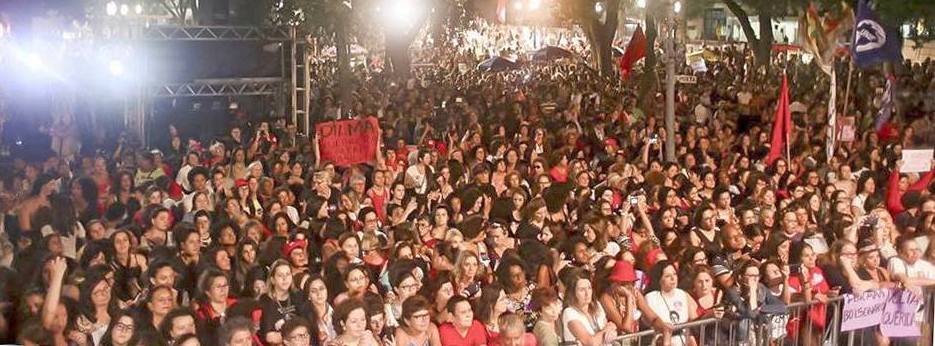
Illegitimately suspended Brazilian President Dilma Rousseff took to the streets in Rio de Janeiro on June 2 along with thousands of women to reject the interim government of Michel Temer, which protesters denounced as a coup regime.
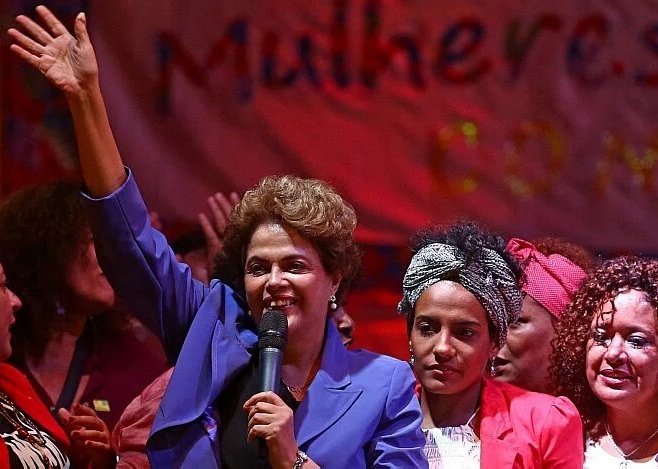
"What unites us here is the democracy of our country, which was won with much struggle," Rousseff said during the demonstration that brought together some 5,000 Brazilians under the banner "Women for Democracy and Against the Coup."
"We know that what happened was a coup and now things will become increasingly clear," she added, alluding to the recent series of damning wiretaps leaked by the media that corroborate the fact that the plan to remove her from office was a coup.
President Rousseff also emphasized the "crucial" role of women in democracy, criticizing Temer's cabinet for only representing a small group of elites. "A government of old and white men does not represent the diversity of our population," she said.
The mobilization came a day after Rousseff's attorney José Eduardo Cardozo presented her defence to the Senate as part of the impeachment trial she faces after being suspended on May 12. The defence included as new evidence in the case excerpts from the most recently leaked wiretaps that implicate high-level opposition figures, including members of Temer's cabinet, in attempts to evade corruption investigations.
"The main reason for the coup against me was to prevent the battle against corruption from reaching them," Rousseff said at the rally.
The women's march also comes less than two weeks after the gang rape of a teenage girl that has sparked widespread outrage and protests against rape culture, violence against women and misogyny in Brazilian society.
Rousseff warned that Brazilians face the threat of a rollback of important social achievements under the interim government. In just three weeks in office, despite his status as an interim and not a permanent or elected president, Temer has moved swiftly to cut back what he calls a "bloated" state. He has cut key ministries and has vowed to cut social spending while promoting the privatization of Brazilian resources and increased access for foreign corporations.
Unions have called the removal of Rousseff a "coup against the working class," while the former head of the now-defunct Ministery of Women, Racial Equality, and Human Rights, Nilma Lino Gomes, labeled it a multidimensional coup with consequences for women, minorities and the working class.
Rousseff was suspended from office for 180 days on May 12 after a 55 to 22 Senate vote decided she should face a trial for impeachment over allegations that she manipulated government accounts to disguise a budget shortfall.
If the Senate, overseen by the Supreme Court,
ultimately
decides to impeach Rousseff with a two-thirds majority vote after
the trial, Temer will be permanently installed as president until
2018. Some Senators have begun changing their positions since the
first vote.
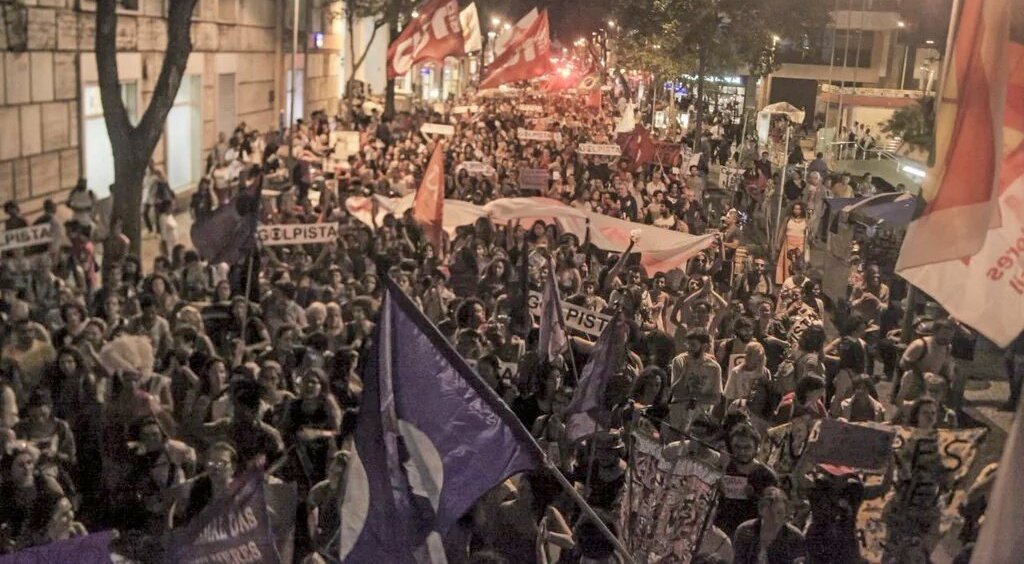
Rousseff's Defence Uses Leaked Evidence to Fight Coup
President Dilma Rousseff's lawyer, José Eduardo Cardozo, presented her defence to the Brazilian Senate at her impeachment trial on June 1. He cited recent leaked recordings of high-level opposition figures scheming to evade corruption investigations as evidence that the impeachment attempt involves the "misuse of powers" as political revenge against Rousseff.
"Several of the statements show that the impeachment attempt occurred not because there is a crime, but because, actually, there was a concern from several segments of the political class in the Operation Car Wash investigation [Lavo Jato]," Rousseff's attorney said in reference to the damning conversations leaked by former state oil executive Sergio Machado.
The recordings have implicated key political rivals, including two members of installed interim President Michel Temer's cabinet and the head of the Senate, in a plot to block corruption investigations targeting bribery in the state oil company Petrobras. Some of the tapes also reveal that the politicians were secretly conspiring with members of the Supreme Court to help ensure Rousseff's ouster and an overhaul of corruption probes.
Cardozo argued that the wiretaps offer a "clear" indication of a "strong coordinated component" in the plan to remove Rousseff from office. "That, to us, reinforces the notion of the misuse of power that in the beginning we attributed, solely and exclusively, to lower house president Eduardo Cunha," he said, singling out the former speaker of the lower house of Congress who spearheaded the impeachment bid against Rousseff.
Cunha was key in painting the impeachment process as a campaign to root out government corruption despite himself facing multi-million dollar bribery and fraud charges. He was suspended from his post as chief of the lower house by the Supreme Court over accusations of intimidating lawmakers and hampering investigations. His suspension came just weeks after the lower house approved going ahead with the impeachment process in a raucous marathon session.
At the end of May, the first tape that was leaked showed that interim Planning Minister Romero Jucá, also head of Temer's PMDB party, had conspired with the Supreme Court and military commanders to guarantee Rousseff's removal as part of a plot to end Operation Car Wash investigations. In a second leak, Senate chief Renan Calheiros planned discussions with the Supreme Court to change key laws directing the fraud probes.
The third and fourth major leaks implicated former dictatorship-era politician and president from 1985 to 1990, José Sarney, and interim President Temer's Transparency Minister Fabiano Silveira, in similar conversations.
Cardozo noted that the
defence continues its line of argument that no crime was
committed.
Some Senators Reconsider Support for Impeachment
Following the exposure of the corruption of members of the Temer interim government through leaked wiretaps, at least three Brazilian Senators have told media outlets that they now regret voting in favor of an impeachment trial of President Dilma Rousseff. For Rousseff to be permanently ousted, two-thirds of the Senate must vote in favor of impeachment at the conclusion of her trial. Out of total of 81 seats in the Senate, two-thirds equals 54 seats. Thus, based on the initial 55 to 22 vote to send Rousseff to trial for impeachment, a change of position from only a few Senators would mean the two-thirds threshold would likely not be met and Rousseff would return to power.
Senators Romario de Souza Faria, Acir Gurgacz and Cristovam Buarque have recently revealed that they are reconsidering their support for the impeachment of Rousseff.
Senator Romario, a former soccer star, criticized the dramatic changes being implemented by the coup-imposed government of Michel Temer.
Romario added that lawmakers must take into consideration the content of leaked conversations, which revealed politicians close to Temer conspired with members of the Supreme Court and military commanders to oust Rousseff and protect corrupt officials from facing justice.
Meanwhile Senator Hélio José has made sharply critical comments about the Temer government, suggesting he too is reconsidering support for her impeachment.
(TeleSUR. Photos: Photo: PT, T. Dezan, R. Borges)
Credibility of Brazil's Interim President Collapses as He Receives Eight-Year Ban on Running for Office
It has been obvious from the start that a core objective of the impeachment of Brazil's elected president, Dilma Rousseff, was to empower the actual thieves in Brasilia and enable them to impede, obstruct, and ultimately kill the ongoing Car Wash investigation (as well as to impose a neoliberal agenda of privatization and radical austerity). A mere 20 days into the seizure of power by the corruption-implicated "interim" President Michel Temer, overwhelming evidence has emerged proving that to be true: Already, two of the interim ministers in Temer's all-white-male cabinet, including his anti-corruption minister, have been forced to resign after the emergence of secret recordings showing them plotting to obstruct that investigation (an investigation in which they, along with one-third of his cabinet, are personally implicated).
But the oozing corruption of Temer's ministers has sometimes served to obscure his own. He, too, is implicated in several corruption investigations. And now, he has been formally convicted of violating election laws and, as punishment, is banned from running for any political office for eight years. Yesterday, a regional election court in São Paulo, where he's from, issued a formal decree finding him guilty and declaring him "ineligible" to run for any political office as a result of now having a "dirty record" in elections. Temer was found guilty of spending his own funds on his campaign in excess of what the law permits.
In the scope of the scheming, corruption, and illegality from this interim government, Temer's law-breaking is not the most severe offense. But it potently symbolizes the anti-democratic scam that Brazilian elites have attempted to perpetrate. In the name of corruption, they have removed the country's democratically elected leader and replaced her with someone who -- though not legally barred from being installed -- is now barred for eight years from running for the office he wants to occupy.
Just weeks ago, Dilma's impeachment appeared inevitable. Brazil's oligarchical media had effectively focused attention solely on her. But then, everyone started looking at who was engineering her impeachment, who would be empowered, what their motives were -- and everything changed. Now her impeachment, though still likely, does not look nearly as inevitable: Last week, O Globo reported that two senators previously in favor were now re-considering in light of "new facts" (the revealed tapes of Temer's ministers), and yesterday, Folha similarly reported that numerous senators are considering changing their minds. Notably, Brazilian media outlets stopped publishing polling data about the public's views of Temer and Dilma's impeachment.
Meanwhile, opposition grows to this attack on democracy both domestically and internationally. Protests aimed at Temer are becoming increasingly large and intense. Two dozen members of the British Parliament denounced the impeachment as a coup. Three dozen members of the European Parliament urged termination of trade negotiations with Brazil's interim government on the ground that it lacks legitimacy. The anti-corruption group Transparency International announced it was terminating dialogue with the new government until it purged corruption from its new ministries. The New York Times this week, reporting on the resignation of the anti-corruption minister only 20 days after he was installed, described it as "another blow to a government that seems to limp from one scandal to the next just weeks after Mr. Temer replaced Dilma Rousseff."
But perhaps nothing quite captures the dangerous farce that Brazilian elites are attempting to perpetrate like the fact that their chosen leader is now literally banned from running for the office into which he has been installed because he has been convicted of breaking the law. This isn't merely the destruction of democracy in the world's fifth most populous country, nor the imposition of an agenda of privatization and attacks on the poor for the benefit of international plutocrats. It's literally the empowerment of dirty, corrupt operators -- outside of democratic norms -- cynically undertaken in the name of combating corruption.
(theintercept.com, June 3, 2016)
Regional Meetings
Cuban President Demands Principles of
Proclamation of
Latin
America as a Zone
of Peace Be Upheld
Army General Raúl Castro Ruz, President of the
Councils of State and Ministers of Cuba, opened the High Level
Segment of the 7th Summit of the Association of Caribbean States
(ACS) in Havana's Palace of the Revolution on June 4. In his remarks he
stated that since its founding, the Organization of American States
(OAS)
was, is and will continue to be an instrument of imperialist
domination and no reform can change its nature. This is why Cuba
will never join the OAS, he affirmed.
 There are challenges we
must face, President Castro added, saying that Cuba cannot remain
indifferent to the unrest which is occurring in Latin America, in
the face of attacks by the oligarchy against progressive
governments. "This is a threat to peace and stability," he stated.
There are challenges we
must face, President Castro added, saying that Cuba cannot remain
indifferent to the unrest which is occurring in Latin America, in
the face of attacks by the oligarchy against progressive
governments. "This is a threat to peace and stability," he stated.
"The situation demands that the principles outlined in the Proclamation of Latin America as a Zone of Peace, adopted during the 2nd CELAC Summit in Havana, be reviewed and upheld." We must demand that other countries, in their relations with our nations, respect these principles, he added.
The principles of the Proclamation include the commitment to non-interference in the internal affairs of states, promoting ties of friendship, tolerance, peaceful coexistence, and respect for the inalienable right of all states to choose their political and social systems. "These are vital considerations for coexistence," Raúl said.
Raúl also reaffirmed Cuba's solidarity with the sister people of Venezuela, the legitimate government of President Nicolás Maduro and the Bolivarian Revolution, initiated by Hugo Chávez, which is currently suffering destabilization attempts by the counterrevolutionary forces.
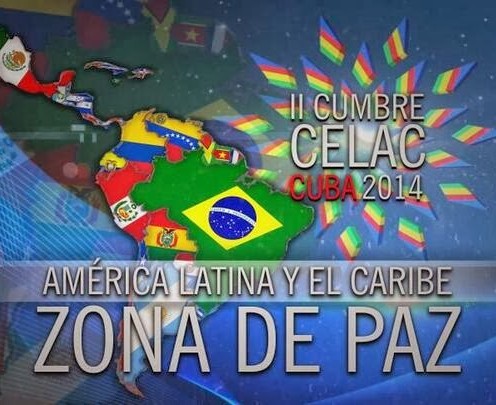 During his speech
Raúl commented that in recent years the ACS
has focused its efforts on promoting cooperation in strategic
areas, which has seen positive results and must continue to be
developed, he noted. The Cuban President also emphasized that
"another priority issue is sovereignty over our natural resources
which are the guarantee for the future and source of wealth for
our peoples."
During his speech
Raúl commented that in recent years the ACS
has focused its efforts on promoting cooperation in strategic
areas, which has seen positive results and must continue to be
developed, he noted. The Cuban President also emphasized that
"another priority issue is sovereignty over our natural resources
which are the guarantee for the future and source of wealth for
our peoples."
We defend the principle that irrational modes of production and consumption must be changed, and stress that such a feat requires the political will of industrialized nations, the President stated.
Raúl noted that weather events associated with climate change will cause severe economic and human losses, stating that cooperation in the area of disaster preparedness must be prioritized in the 2016-2018 Action Plan.
President Castro highlighted that Cuba is interested in expanding and strengthening cooperation ties with other Caribbean nations in the sphere of tourism.
Raúl stressed the achievements and regional challenges -- which include the difficulty and high cost of air and maritime connectivity -- outlined in the Declaration of Petion Ville, Haiti, which he noted "compel us to find solutions for all."
(Granma, June 4, 2016. Photos: Cubadebate)
Seventh Summit of Association of
Caribbean States
Promotes Unity
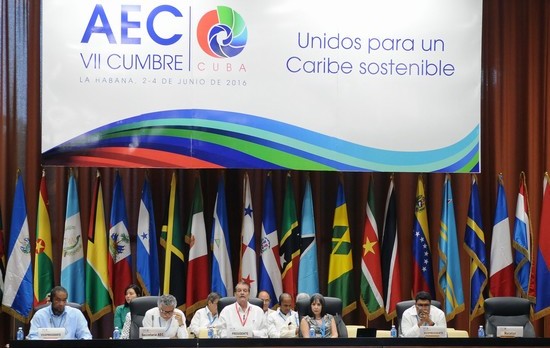
The Seventh Summit of the Association of Caribbean States (ACS) is being held in Havana, June 2-4, where the adoption of a Declaration and Plan of Action is scheduled, to contribute to the revitalization process of the organization which began a few years ago.
Cuba assumed the pro tempore presidency of the ACS on January 19, previously held by Haiti. During the handover ceremony in Port-au-Prince, Cuban Foreign Minister Bruno Rodríguez Parrilla expressed Cuba's commitment to continue working for Caribbean integration and to boost efforts to contribute to the revitalization of the body.
"Cuba is an unconditional and enthusiastic ally of the organization's tasks and understands the potential of the Association of Caribbean States for the implementation of strategic programs in the Caribbean," expressed Alfonso Múnera, ACS Secretary General, during an interview last year with Granma.
Comprising 25 Member States and seven Associate Members, the ACS came to be on July 24, 1994, with the signing of the Convention Establishing the Association of Caribbean States, in Cartagena de Indias, Colombia, "with the aim of promoting consultation, cooperation and concerted action among all the countries of the Caribbean," according to its website.
With the motto "Promoting the sustainable development of the Greater Caribbean," the ACS has focused on fundamental issues for the region such as trade, transport and tourism, identified since the First ACS Summit held in 1995 in Trinidad and Tobago, where the organization's operational headquarters are based.
One of the major achievements of this regional body has been the establishment of the Sustainable Tourism Zone of the Caribbean (STZC), the first of its kind in the world, which came into effect on November 6, 2013.
The STZC is based on the premise that tourism is one of the most important economic components for the region, thus protecting and guaranteeing this sector in the long term is its primary purpose.
According to the website of the Caribbean bloc, "the STZC is a proactive and innovative initiative by the ACS, incorporating the principles of sustainable development in integrated tourism planning" and "represents a unique approach to co-ordinate regional efforts in the area of tourism development."
Objectives
The strengthening of the regional co-operation and integration process, with a view to creating an enhanced economic space in the region.
Preserving the environmental integrity of the Caribbean Sea which is regarded as the common patrimony of the peoples of the region.
Promoting the sustainable development of the Greater Caribbean (common geographic space shared by ACS states, countries and territories). The Greater Caribbean Zone of Co-operation consists of joint actions in the priority areas of the ACS, namely, trade, sustainable tourism, transport and disaster risk reduction.
Organization
Ministerial Council:
President for 2016: Bruno Rodríguez Parrilla (Cuban Foreign Minister)
Office of the Secretary General:
- Secretary General: Alfonso Múnera
Cavadía
- Special Committees
- Council of National
Representatives of
the Special Fund of the ACS
Associated Members: have the right to intervene in discussions and vote at meetings of the Ministerial Council and Special Committees on matters which affect them directly, falling within their constitutional competence. They are: Aruba; Curacao; France on behalf of (French Guiana, Saint Barthelemy and Saint Martin); Guadeloupe; Martinique; Sint Maarten; The Netherlands Antilles on behalf of (Saba and Sint Eustatius)
Special Committees:
- Trade Development and External Economic Relations
-
Sustainable Tourism
- Transport
- Disaster Risk Reduction
-
Budget and Administration
Observers: may be admitted to the Association on terms and conditions as may be determined by the Ministerial Council, in accordance with Article V of the Convention Establishing the Association of Caribbean States. They are: Argentina; Belarus; Brazil; Canada; Chile; Ecuador; Egypt; Finland; India; Italy; Kingdom of the Netherlands; Korea; Morocco; Peru; Russia; Serbia; Slovenia; Spain; Turkey; Ukraine; United Kingdom.
Social Partners: to contribute effectively to the accomplishment of the goals set forth by the organisation, pertinent decisions of the Ministerial Council, and the activities outlined in the Work Programmes of the Special Committees. They are:
- The Antilles-French Guiana Regional Centre of the
National
Institute of Agronomical Research (CRAG/INRA)
- Association of
Caribbean Universities and Research Institutes (UNICA)
-
Association of Caribbean University, Research and Institutional
Libraries (ACURIL)
- Caribbean Association of Industry and
Commerce (CAIC)
- Caribbean Conservation Association (CCA)
-
Caribbean Medical Association (AMECA)
- Caribbean Shipping
Association (CSA)
- The Regional Economic and Social Research
Coordinator (CRIES)
- The Latin American Faculty of Social
Sciences (FLASCO)
- The University of the West Indies (UWI)
Founding Observers: participate in the works of the Ministerial Council and the Special Committees. They are:
- Caribbean Community (CARICOM) Secretariat
- Latin
American
Economic System (SELA)
- Central American Integration System
(SICA)
- Permanent Secretariat of the General Agreement on
Central American Economic Integration (SIECA)
- United Nations
Economic Commission for Latin America and the Caribbean (ECLAC)
- Caribbean Tourism Organisation (CTO)
Observer Organizations:
- Central American Economic Integration Bank (CABEI)
-
European Union (EU)
- International Organization for Migration
(IOM)
(Granma. Photo: R. Pupo)
Second Parliamentary Meeting for Latin American and Caribbean Integration Held in Argentina
The Second Parliamentary Meeting for Latin American and Caribbean Integration took place in the Delia Parodi Hall at the Argentine Congress' Chamber of Representatives on June 1.
At the meeting, attended by representatives of Argentina, Brazil, Bolivia, Chile, Costa Rica, Cuba, Ecuador, Nicaragua, Panama, Uruguay and Venezuela, legislators evaluated the present instability in the region.
In particular, they discussed the institutional coup in Brazil and the hostility against Venezuela, including the threat of an armed intervention by the United States, revealed in U.S. Southern Command documents.
Local deputies analyzed the change in foreign policy carried out by the new government of Argentina, which they pointed out promotes divisiveness, the return to neo-liberalism and the weakening of integrating mechanisms like the Southern Common Market (MERCOSUR), the Union of South American Nations (UNASUR) and the Community of Latin American and Caribbean States (CELAC).
Cuban Deputy Yoerky Sánchez was one of the participants. He explained to Prensa Latina that Cuba categorically supports the people's Bolivarian project in Venezuela and the lawful government of President Nicolás Maduro, which is under siege and facing increasing hostility.
Sánchez also rejected the proliferation of military bases in the region, which goes against the principle agreed to during the 2014 CELAC Summit in Havana to declare the region a zone of peace.
Puerto Rico
Obama Continues to Ignore Pleas to Free Political Prisoner Oscar López Rivera
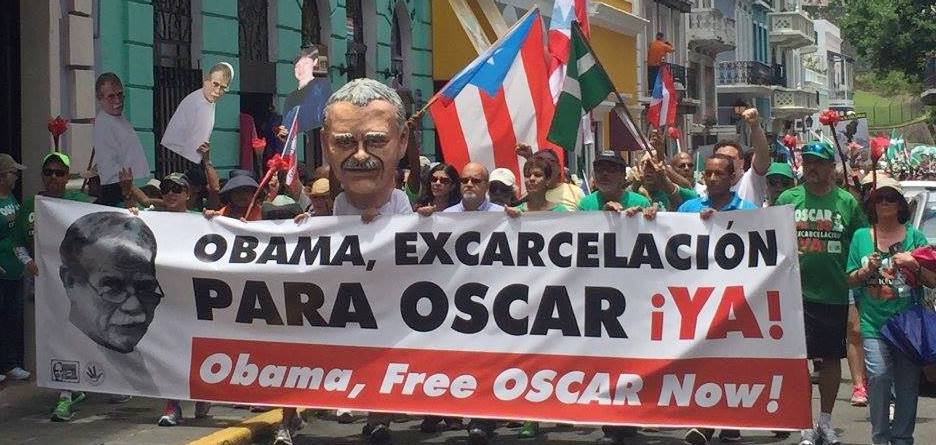
San Juan, Puerto Rico, May 29, 2016
Two and a half months ago, asked by award-winning playwright Lin-Manuel Miranda about imprisoned Puerto Rican nationalist Oscar López Rivera -- whose only crime, according to Nobel Peace Laureate Archbishop Desmond Tutu, is "conspiracy to free his people from the shackles of imperial justice," President Barack Obama told the [Broadway musical] Hamilton creator that he "had [the case] on his desk." Miranda, whose parents hail from Puerto Rico, used his invitation to the White House to bring up the issue of López Rivera's continued incarceration, which is of tremendous importance to Puerto Ricans. Both on the island and in the diaspora, freedom for the 73-year-old political prisoner enjoys overwhelming popular support and has united people across the political spectrum.
|
|
[May 29] marked the 35th anniversary that López was imprisoned. He was convicted in 1981 of "seditious conspiracy" for trying to overthrow the U.S. government by force, as well as minor charges including possession of firearms and transporting stolen vehicles across state lines. López was accused of holding a leadership position in the FALN (Fuerzas Armadas de Liberación Nacional Puertorriqueña) -- a Puerto Rican nationalist organization, which he did not admit to but did not dispute. The group claimed responsibility for a series of bombings in Chicago and New York during the 1970s and 1980s, though as the Chicago Tribune noted the bombings were carried out "to damage property rather than persons" and the FALN "were out to call attention to their cause rather than to shed blood."
López was never personally tied to any bombing or any other act of violence that resulted in the death or injury of any person. Undoubtedly, if the government possessed any evidence of his participation in, or organization of, a violent act they would have charged him with it in court. But they merely charged him with conspiracy to commit sedition, the same political charge used by the apartheid South African government to convict Nelson Mandela two decades earlier. López has now served seven more years in prison than Mandela did before being freed and becoming South Africa's first post-apartheid President.
Thousands of people gathered [May 29] in San Juan to mark the 35th anniversary of López's imprisonment and demand his release. Marchers chanted "Obama, listen to me! We want Oscar free" and "We don't want this board, we want to be free," according to Fox News Latino.
The latter slogan references the stipulation in the Puerto Rico Oversight, Management and Economic Stability Act (PROMESAS) that would create a financial control board made up overwhelmingly of members from outside the island and not appointed by representatives elected by Puerto Ricans. The board would be vested with power over all fiscal decisions, effectively overriding Puerto Rico's own elected representatives. The bill was passed by a House committee on [May 25] and is expected to draw a vote in the full chamber next month. It has the support of leadership in both the Republican and Democratic parties in Congress as well as the Obama administration.
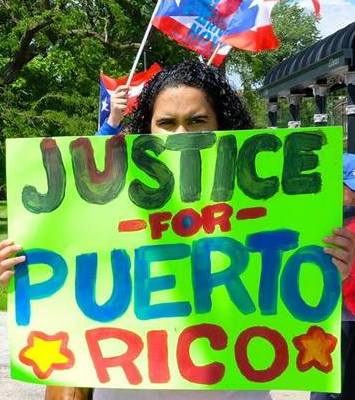
But Puerto Rican Governor Alejandro García Padilla and much of the Puerto Rican public are opposed to what they see as an overt imposition of colonialism by allowing unelected technocrats -- not representative of or accountable to the Puerto Rican people -- to hold veto power over spending decisions, and even decrease the minimum wage.
López himself opposes the financial control board, telling El Nuevo Día in a phone interview (prison officials denied the newspaper's request for an in-person interview): "This is a problem created by Washington. The problem is in Washington and Wall Street. The people of Puerto Rico should not accept it. No Puerto Rican should doubt that we can solve our own problems... We need for them to respect our right to self-determination and not depend on the crumbs that Washington gives us."
Obama's answer to Miranda about whether he would grant López a pardon or commutation suggests a sense of urgency. If the matter is indeed "on his desk," he presumably intends to take swift action on it. However, this is clearly not the case. Both Obama's record as having issued fewer pardons than almost any President in history, and his years of refusing to attend to López's case in particular, attest to Obama's indifference to the unjust detention of prisoners by the government he leads.
Since being elected seven years ago, Obama has been directly presented with appeals to free López Rivera from three fellow Nobel Peace Laureates, Puerto Rico's non-voting member of Congress, Puerto Rico's current governor and foreign presidents. Venezuelan President Nicolás Maduro even publicly offered to release opposition leader Leopoldo López if Obama released López Rivera. Yet the Obama administration has maintained its silence.
Last week, three Puerto Rican American members of Congress -- Luis Gutiérrez, Nydia Velázquez and José Serrano, along with Puerto Rico's Resident Commissioner Pedro Pierluisi -- revealed that they had sent a letter to Obama in February calling on him to grant clemency to the man who has now spent nearly half his life behind bars without ever being charged with an act of violence.
After months without receiving a response, the legislators decided to go public to try to put pressure on Obama to recognize the will of virtually all of Puerto Rico and issue a pardon.
"You know how much this means to us, because we have personally expressed it to you. To our understanding, there is no legimitate criminological objective in continuing the imprisonment of this 73-year-old Puerto Rican, when his country and others that value human rights clamor for his liberation," they revealed that they wrote to the President.
Two and a half years ago, I argued that Obama's refusal to free López was emblematic of the propensity of the U.S. government to ignore the political demands of the Puerto Rican people and solely use the colonial relationship to pursue the perceived economic and strategic interests of the ruling class:
Without any representation in Congress or a vote in Presidential elections, Puerto Ricans have their political rights subjugated to the U.S. government. Even on an issue as popular among Puerto Ricans as the release of Oscar López, they have no recourse to participate in the political process at the federal level.
There is no indication that Obama intends to even respond to López's clemency plea, much less grant it. In his speech at Nelson Mandela's funeral, Obama said that "around the world today, men and women are still imprisoned for their political beliefs." The overwhelming opinion among Puerto Ricans is that this description applies precisely to López.
The disregard that Obama has shown for recognizing the will of Puerto Ricans to free Oscar López demonstrates the uphill challenges Puerto Ricans face to shed their second-class status and obtain equal rights. If the President refuses even to grant a simple pardon, what chance do Puerto Ricans have of the U.S. government acting on the 2012 referendum and allowing them to achieve self-determination?
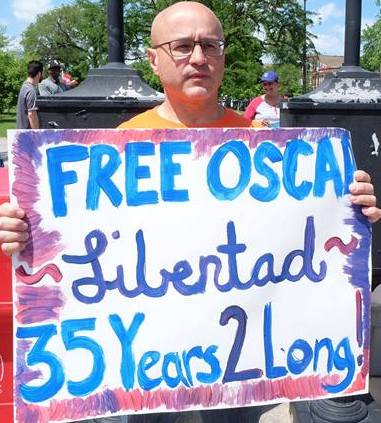
The question of why Puerto Ricans would believe that anyone in the U.S. government respects their opinions or their political desires should be more urgent than ever. We are in the middle of another campaign season, which for many Americans is seen as an opportunity for them to participate in the political process by voting in elections. However, for Puerto Ricans it is another reminder that while they are American citizens, they are denied the right given to Americans in the states to select Congressional representatives and take part in the Presidential election.
The policies that will be decided after the election at the federal level will apply to Puerto Ricans, though they will have had no role in choosing those policies and no way to voice their dissatisfaction at policies they oppose by voting out those who supported them.
The only way Puerto Rico can recover from its economic and debt crisis, as López Rivera said in his interview with El Nuevo Día, would be to achieve sovereignty and self-determination. This would grant them the ability to prioritize local business and the needs of the population, and free them from being merely a captive market for U.S. products and a source of cheap labor for U.S. corporations.
But any promise that the 2012 referendum, in which a 54 per cent majority rejected the current colonial status, had of achieving this has disappeared. The U.S. Congress, which must approve any change in Puerto Rico's political status, has not given any indication it will even consider doing anything to end the "Commonwealth" colonial status that Puerto Ricans voted against.
On the contrary, Puerto Ricans are being presented with the prospect of a financial control board that is a blatant affront to the idea that people should rule themselves, and a reminder of their powerlessness as colonial subjects.
The fact that Oscar López Rivera still sits
unjustly in a
prison cell is proof that the voices of Puerto Ricans simply do
not matter to first-class American citizens on the mainland who
hold power.
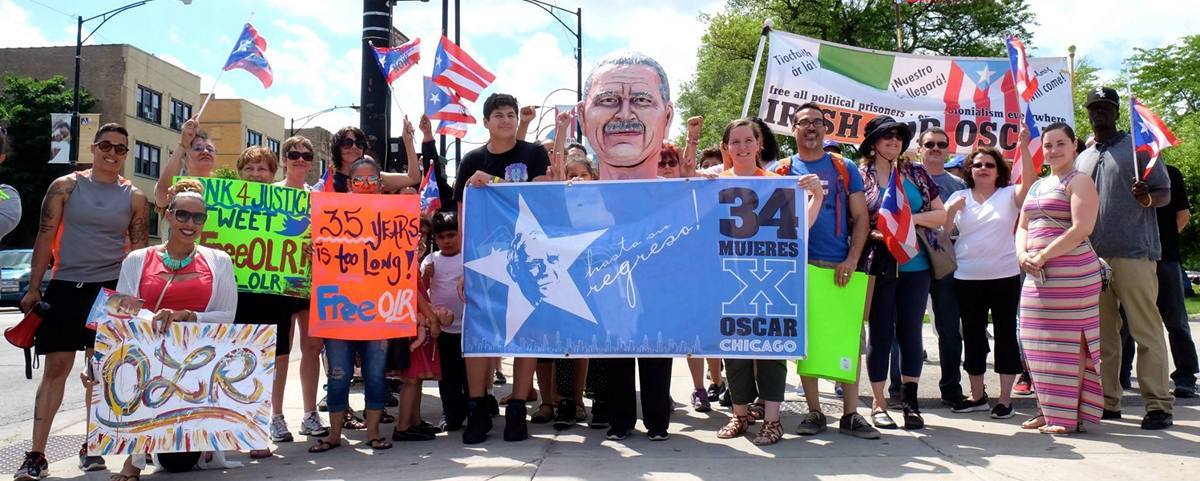 Chicago, May 29, 2016
Chicago, May 29, 2016
(Just the Facts blog, May 30, 2016.
Photos: TeleSUR, National Boricua Human Rights Network,
Puerto Rico Human Rights Committee)
32nd Anniversary of Operation Blue Star
Justice Is Not Yet Served

Original Akal Takht, Darshani Deori and surrounding area prior to
Operation Blue Star.
Thirty-two years ago, from June 3-8, 1984, the Indian government of Indira Gandhi carried out the devastating assault and massacre of innocent Sikhs at the Golden Temple complex in Amritsar, Punjab, known as Operation Blue Star.
|
|
The stated aim of Operation Blue Star was to "flush out" so-called "Religious Terrorists" led by Sant Jarnail Singh Bhindranwale. Operation Blue Star was carried out in the context of the concerted action of the Indian and Canadian states to criminalize the political demands of Sikhs for statehood for Punjab -- the creation of Khalistan. They labelled the proponents of this demand "Sikh fundamentalists." By associating Sikhism with extremism they managed to criminalize all Punjabis as Sikhs, even those who were not religious in any way. This served as the model for the subsequent targeting of all people of the Muslim faith and the demand that people prove their loyalty to the state by demonstrating that they are moderates. Meanwhile, as in the case of the Sikhs, all Muslims have become "fair game."
The Golden Temple is the holiest site of Sikhs. By modern standards the state is not permitted to interfere with a person's conscience and the practice of their beliefs within the sanctuary of their own church. The Indian army operation against the Golden Temple violated the sanctity of a place of worship and established the precedent that holy places would henceforth no longer be considered a safe haven from persecution or a refuge from the action of the state.
The military action, which included tanks, helicopters, armoured vehicles, artillery and chemical weapons, was timed to take place on the anniversary of the martyrdom of Guru Arjan Dev, which was 410 years ago this year.[1] Over 70,000 troops were ordered to capture less than 50 men. The military assault occurred under cover of a total media blackout -- thousands of innocent civilians were killed over five days.
|
|
The storming of the centre of Sikh spiritual and temporal authority by the Indian Army under the orders of Indira Gandhi led immediately to a mutiny in Sikh units of the Army and four months later, on October 31, to the assassination of Indira Gandhi by her Sikh bodyguards. Ruthless anti-Sikh pogroms were unleashed by the Indian state to wreak revenge. Thousands of innocent Sikhs were beaten and burned alive during the anti-Sikh pogroms on November 1, 2 and 3. The state-organized anti-Sikh mobs massacred over 8,000 innocent Sikhs, 3,000 in Delhi alone.
The police stood by and watched and, in some cases, actively participated in the attacks. It is estimated that subsequent government operations Woodrose, Blackthunder, Night Dominance, Rakshak I and II, and Final Assault led to the deaths of 25,000 to 80,000 Sikhs.
The government officials who are known to have instigated, authorized and organized the violence subsequently enjoyed promotion, including to cabinet positions and decades of impunity despite repeated demands for justice.
Note
1. Guru Arjan Dev is said to have been one of the most enlightened men of his times. He was a scholar, poet, visionary, administrator, teacher and architect. He standardized the Gurmukhi script, collected the works of saints, sufis and faqirs from across India that he then edited in the form of Adi Granth, which became the holy book of the Sikhs. He also founded new cities and discovered new methods of irrigation and agriculture.
He was very popular amongst people of all religions. While he had a great following among the people, some of the members of the ruling elite were envious of his popularity and growing strength. Chandu Shah, a banker from Lahore, wanted to marry his daughter to the son of Guru Arjan Dev but the Guru refused the alliance. This offended the banker and he schemed with others at the Moghul Emperor's court against the Guru.
Emperor Jehangir is thought to have held a grudge against the Guru as the latter had supported his brother Khusro. He accused Arjan Dev of being an infidel and of insulting Islam. The Guru was fined two lakh rupees and, if he did not pay it, he was to be tortured and killed. The governor of Lahore, egged on by Chandu Shah, took it upon himself to torture the Guru. Guru Arjan Dev forbade his followers to collect the blood money to save his life as he thought he was only exercising his right to conscience. The great Sufi Saint of Lahore, Mian Mir, who had laid the foundation of the Golden Temple, also tried to intercede on behalf of the Guru.
The Guru was made to sit on a red hot iron girdle and hot oil was poured on him. Eye witnesses point out that the Guru did not even utter a sigh. After days of torture like this, he was killed.
The martyrdom of Guru Arjan Dev was a turning point in
the
history of Punjab. He instructed his son Hargobind to bear arms
to fight the tyranny of the ruling elites. Some scholars claim
that this is when the martial organizing of Sikhs began in
Punjab.
(J. Singh)
Website: www.cpcml.ca Email: editor@cpcml.ca
 In fact, laws which permit
state financing of political
parties and state control over their expenditures increasingly
violate the people's right to conscience and freedom of
association. They have done nothing to resolve the profound
crisis in which the political parties are mired because these
political parties were formed to serve a system of representative
democracy which no longer functions. This is why democratic
renewal which empowers the people is required, not reforms which
further entrench the power of the ruling elite and disempower the
people.
In fact, laws which permit
state financing of political
parties and state control over their expenditures increasingly
violate the people's right to conscience and freedom of
association. They have done nothing to resolve the profound
crisis in which the political parties are mired because these
political parties were formed to serve a system of representative
democracy which no longer functions. This is why democratic
renewal which empowers the people is required, not reforms which
further entrench the power of the ruling elite and disempower the
people.

 The Subcommittee is carrying
on the same course of stirring
up a phoney debate on human rights in Venezuela and fabricating
pretexts for Canada to involve itself in regime change. This is
unacceptable and must be opposed.
The Subcommittee is carrying
on the same course of stirring
up a phoney debate on human rights in Venezuela and fabricating
pretexts for Canada to involve itself in regime change. This is
unacceptable and must be opposed. MPs on the Subcommittee did
not express any concern for the
human rights of the Venezuelan people. These rights are realized
through the country's many social programs, public enterprises
and the enshrinement of rights of the workers and others in
Venezuela's constitution and law, all of which the opposition has been
attempting to overturn since the forces of the oligarchy won a
majority in the National Assembly in the December 6, 2015
election. Venezuelans are also being denied their right to food
through price manipulation and fabricated food shortages by the
wealthy elites that are part of the opposition forces. Similarly,
no concern was expressed about the violation of Venezuelans'
right to security of person through the deadly street violence
fomented by opposition forces, assaults and even killings of
government deputies and government supporters.
MPs on the Subcommittee did
not express any concern for the
human rights of the Venezuelan people. These rights are realized
through the country's many social programs, public enterprises
and the enshrinement of rights of the workers and others in
Venezuela's constitution and law, all of which the opposition has been
attempting to overturn since the forces of the oligarchy won a
majority in the National Assembly in the December 6, 2015
election. Venezuelans are also being denied their right to food
through price manipulation and fabricated food shortages by the
wealthy elites that are part of the opposition forces. Similarly,
no concern was expressed about the violation of Venezuelans'
right to security of person through the deadly street violence
fomented by opposition forces, assaults and even killings of
government deputies and government supporters.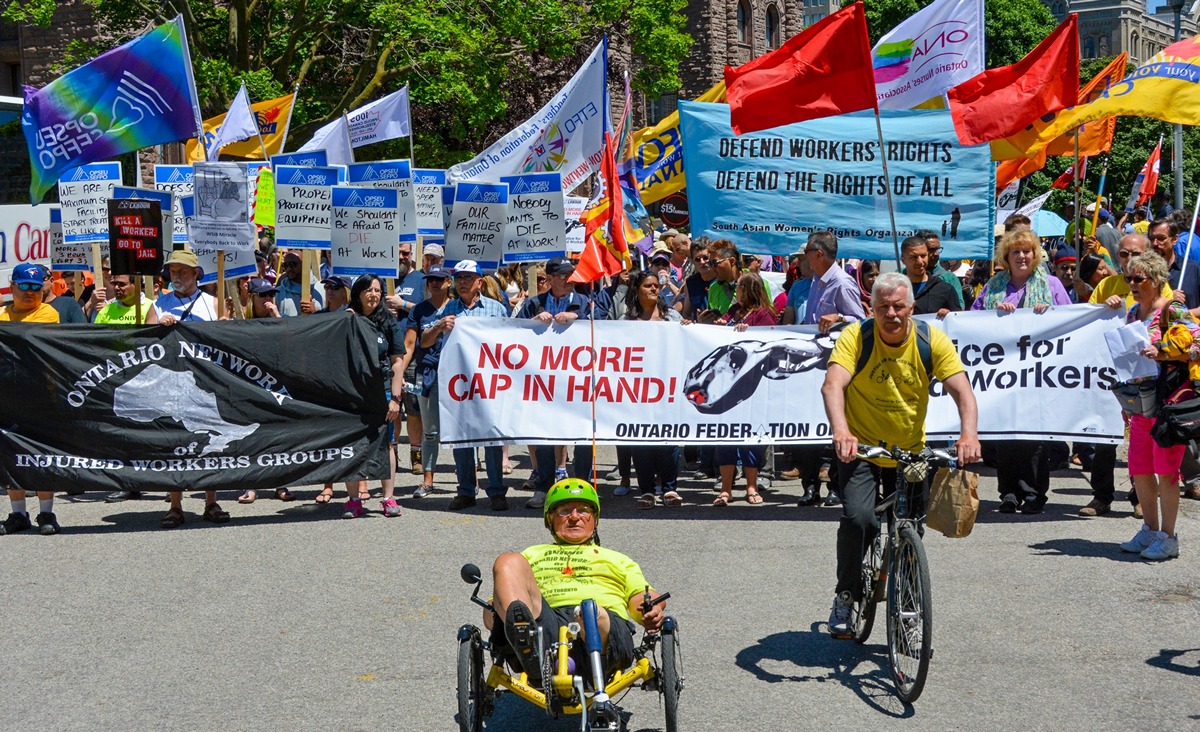
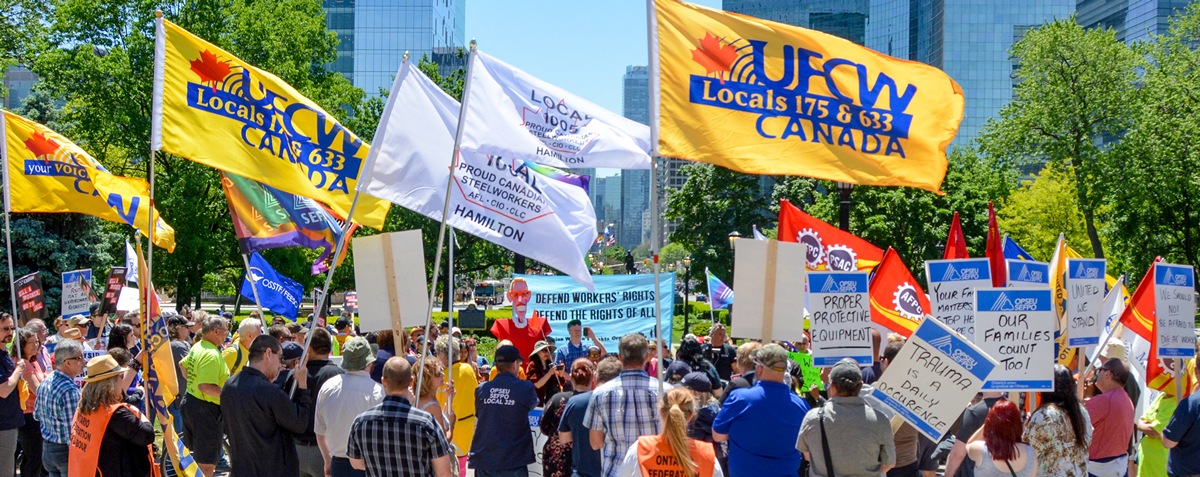
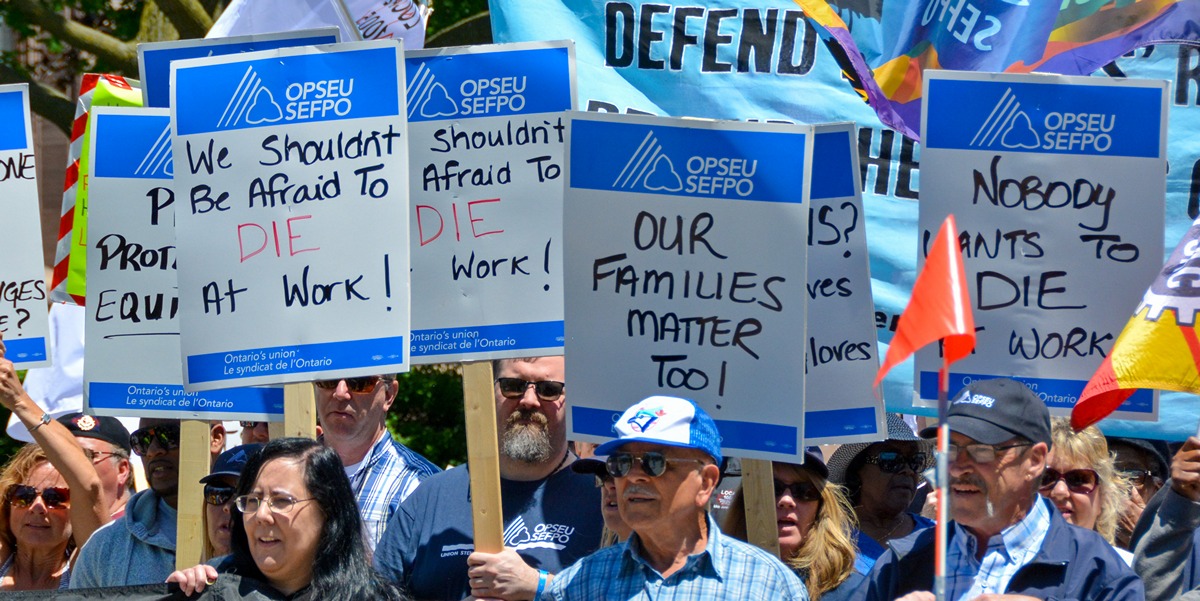
 The
rally welcomed Richard
Hudon and Peter Page of the
Justice for Injured Workers Bike Ride, who had just completed
their 600-kilometre trip from Windsor to Toronto, raising awareness of
the fight
that injured workers are waging in Ontario and across Canada for their
rights and dignity. Richard recounted
with emotion the experience of not being able to visit the memorial to
the
Victims of Chemical Valley in Sarnia because the memorial site itself
has been
condemned due to asbestos contamination. He also introduced a
young man invited to participate in next year's ride,
who has lost both legs and has had to wage a vigorous fight to
force the WSIB to provide him with artificial limbs rather than just a
wheelchair. Richard gave his own example of how WSIB is nickel and
diming injured workers, explaining that the WSIB has rejected his
doctor's advice that he be provided with a replacement prosthetic leg,
claiming that he is too old.
The
rally welcomed Richard
Hudon and Peter Page of the
Justice for Injured Workers Bike Ride, who had just completed
their 600-kilometre trip from Windsor to Toronto, raising awareness of
the fight
that injured workers are waging in Ontario and across Canada for their
rights and dignity. Richard recounted
with emotion the experience of not being able to visit the memorial to
the
Victims of Chemical Valley in Sarnia because the memorial site itself
has been
condemned due to asbestos contamination. He also introduced a
young man invited to participate in next year's ride,
who has lost both legs and has had to wage a vigorous fight to
force the WSIB to provide him with artificial limbs rather than just a
wheelchair. Richard gave his own example of how WSIB is nickel and
diming injured workers, explaining that the WSIB has rejected his
doctor's advice that he be provided with a replacement prosthetic leg,
claiming that he is too old.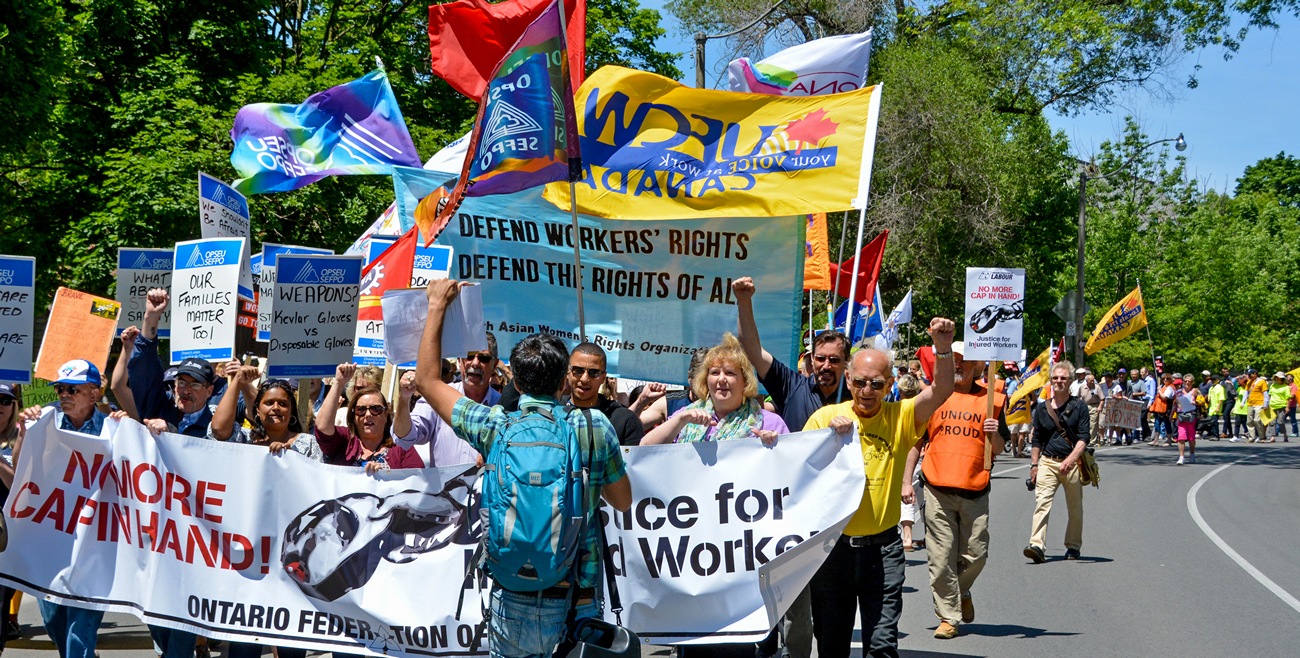
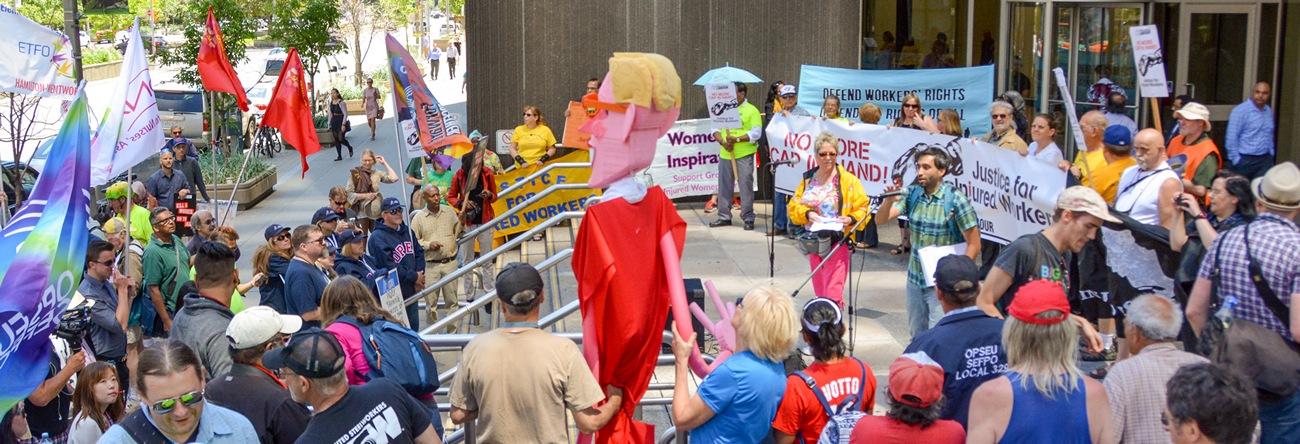
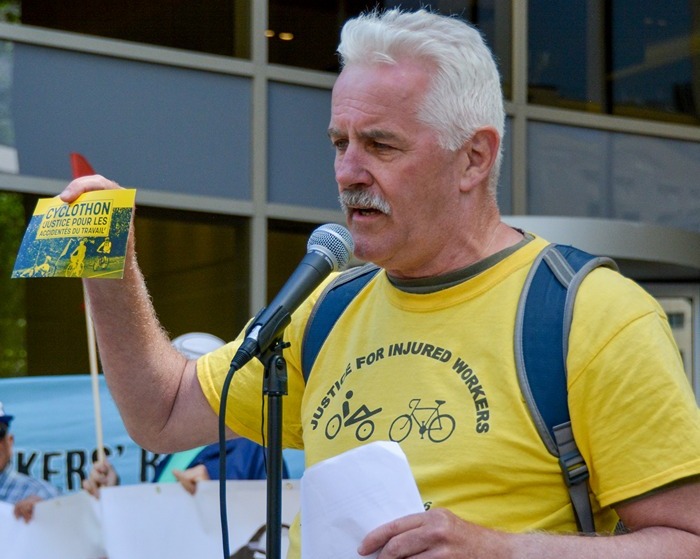 Chris Buckley, President of
the Ontario Federation of
Labour (OFL) pledged the federation's ongoing support for injured
workers. No worker in Ontario should be denied the right to work in a
safe and healthy workplace, he said, adding that when someone is
injured on the job, they should receive all the compensation and
assistance necessary to enable them to return to work.
Chris Buckley, President of
the Ontario Federation of
Labour (OFL) pledged the federation's ongoing support for injured
workers. No worker in Ontario should be denied the right to work in a
safe and healthy workplace, he said, adding that when someone is
injured on the job, they should receive all the compensation and
assistance necessary to enable them to return to work.
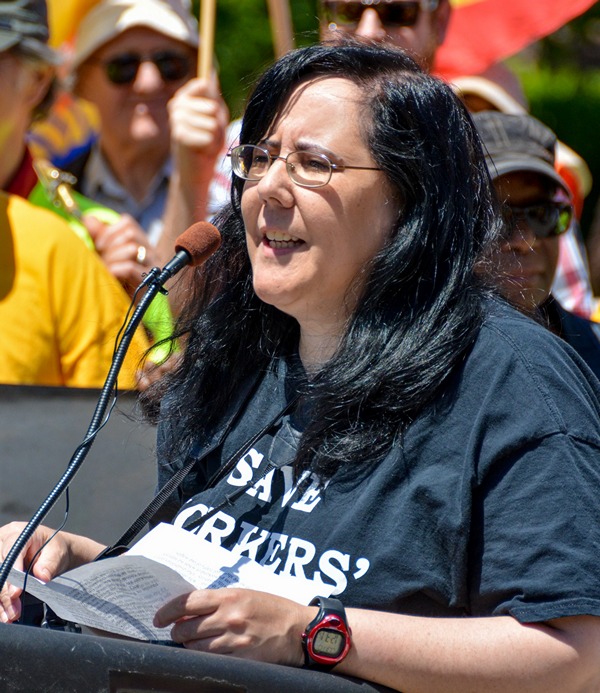

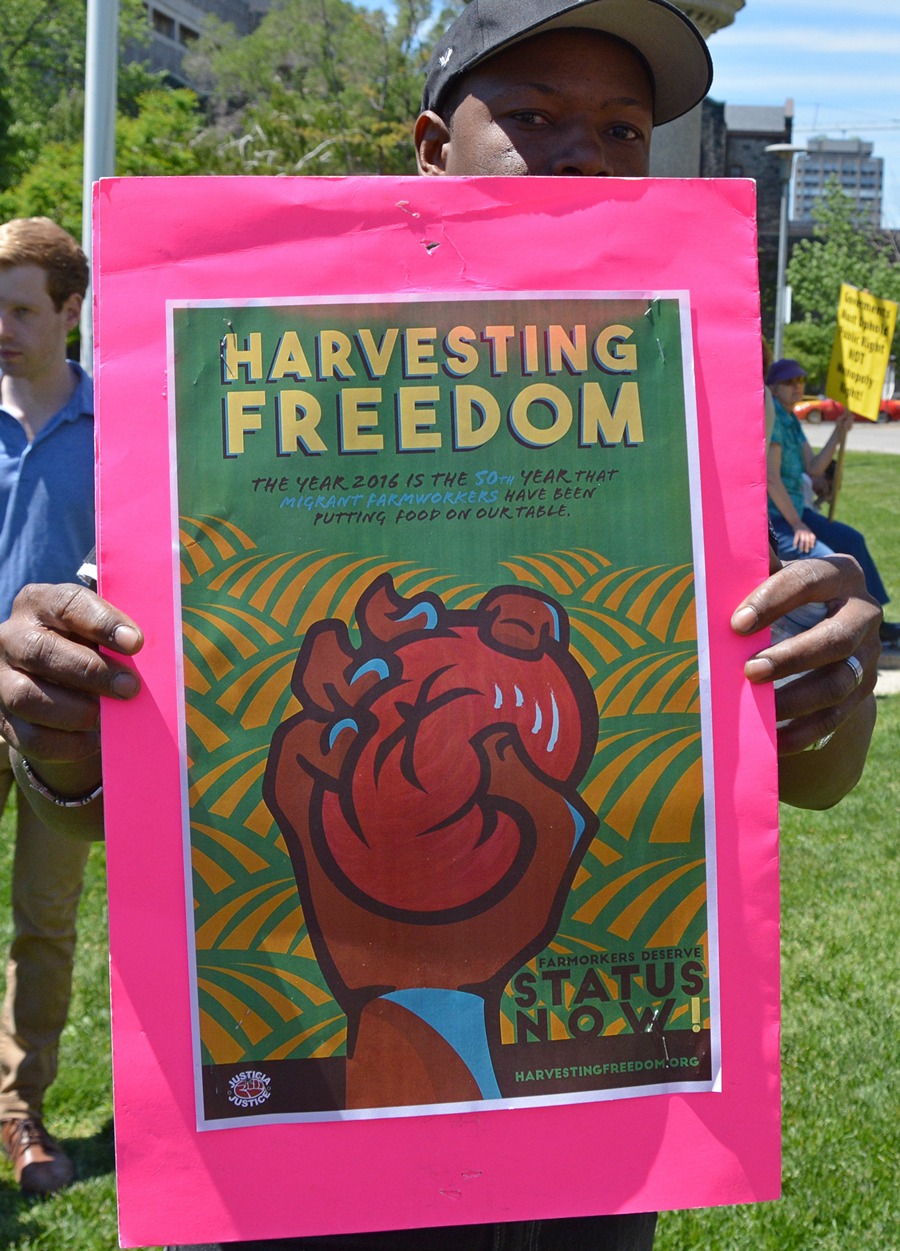
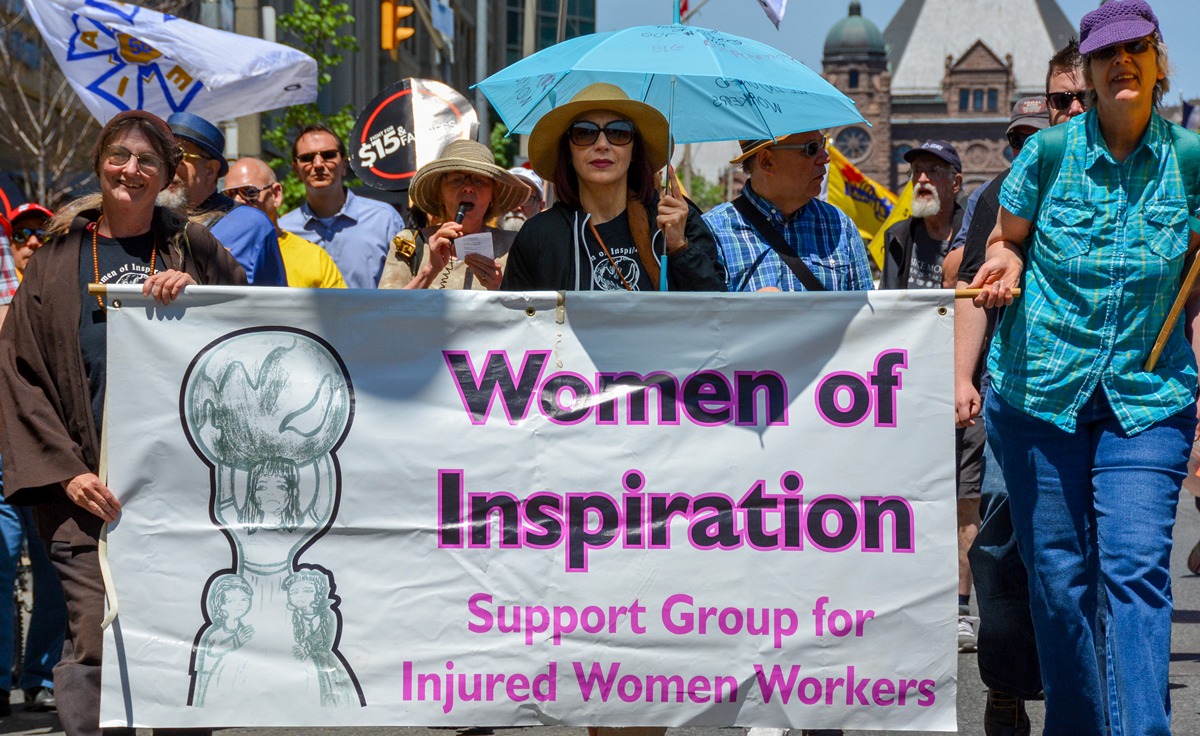
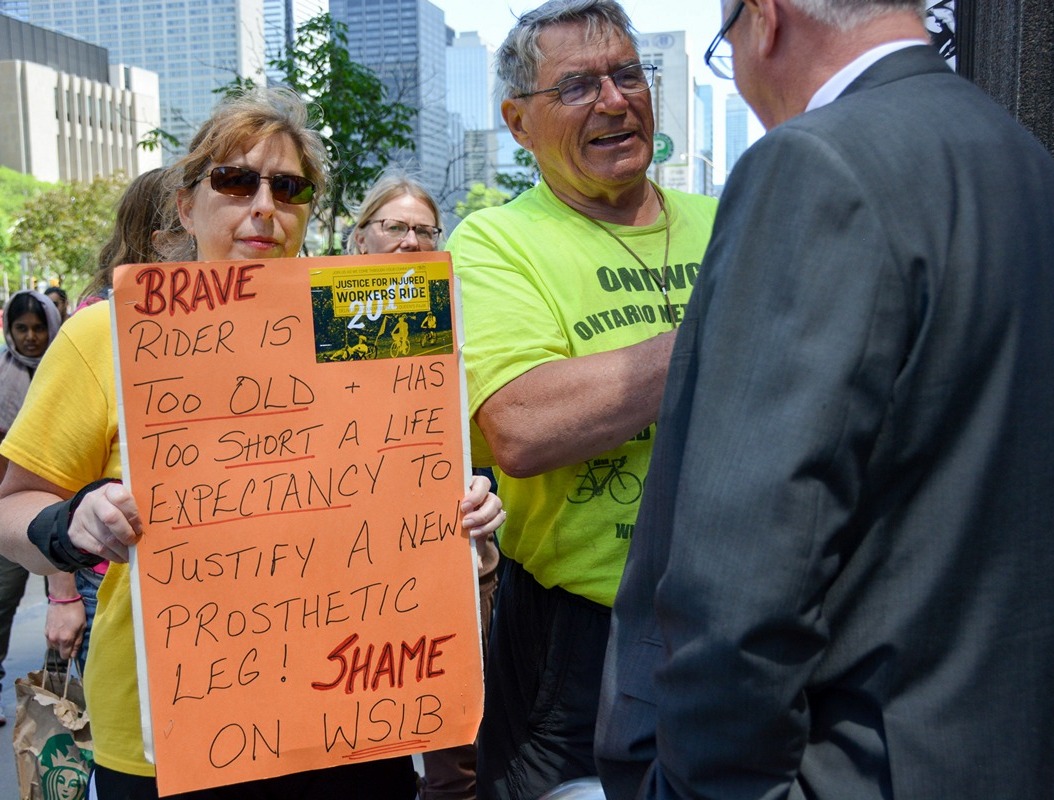
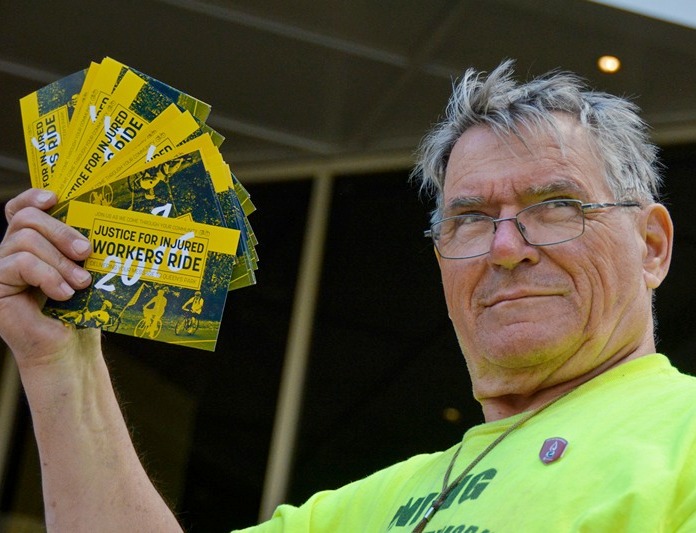
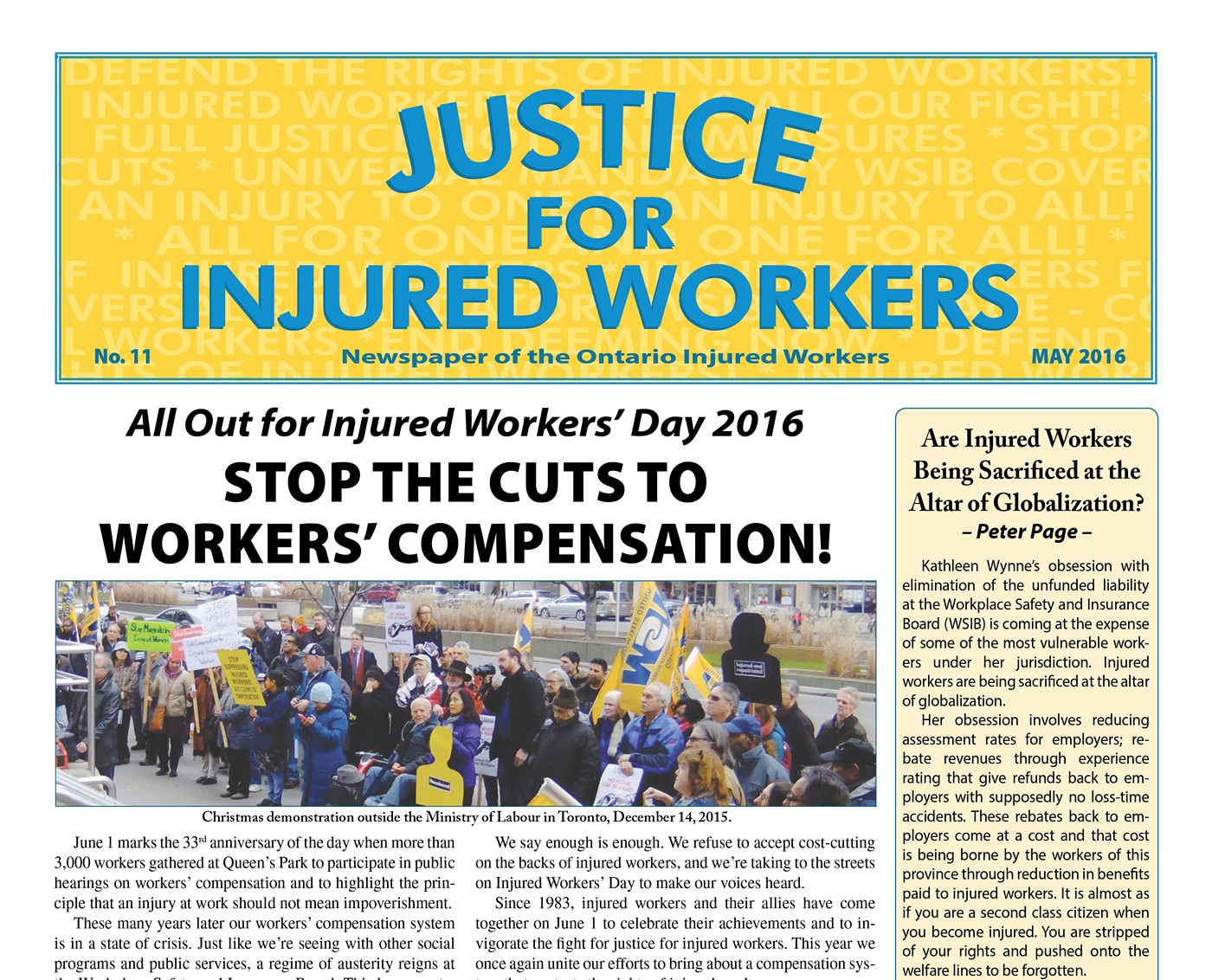 The May issue of
The May issue of 